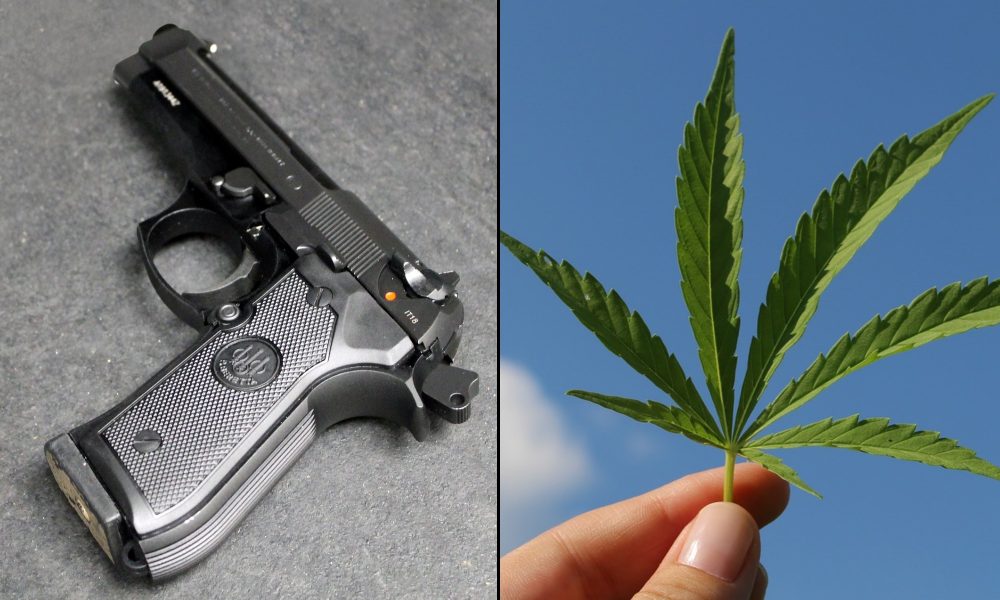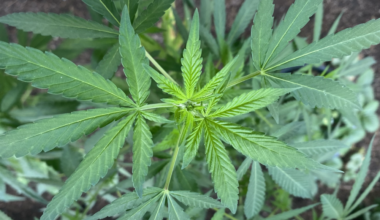Florida agriculture commissioner and Democratic gubernatorial candidate Nikki Fried held a meeting with gun violence prevention activists on Thursday to address the lawsuit she recently filed against the Biden administration that seeks to protect Second Amendment rights for medical marijuana patients.
And while some progressive advocates initially balked at the action to increase the ability of certain people to possess firearms, key community members say that Fried’s outreach and education helped raise awareness of the legal issues at hand, and they support the effort on a constitutional and public safety basis.
Fried has made a point to align herself with the cannabis reform movement throughout her tenure and campaign, but mixing that advocacy with gun rights issues apparently raised some questions within the prevention community. To help facilitate a conversation and answer questions, the father of a Parkland shooting victim reached out to Fried and scheduled a virtual meeting with about a dozen other activists in the movement.
Fred Guttenberg, whose daughter Jaime was killed in the 2018 mass shooting, told Marijuana Moment in a phone interview on Friday that when he first read the news about the suit, his “initial instinct was not to understand what the commissioner was doing.” But after they spoke on the phone, “she explained everything about the lawsuit—what she was doing and why—and it made total sense to me. But I needed that information.”
Just concluded a zoom with @NikkiFried & members of the GVP community. Thank you, Nikki, for taking time to fully explain the lawsuit around legal marijuana users & background checks. This lawsuit makes sense to me, and I fully support your doing this. https://t.co/Ysjg4XMe6G
— Fred Guttenberg (@fred_guttenberg) April 28, 2022
Fried “wants to bring all legal, lawful people into the process of having a background check” to buy a firearm, “and, candidly, I support that,” Guttenberg said. In that sense, he said, allowing medical cannabis patients to complete federal gun purchasing forms without being penalized for participating a state-legal program is a public safety matter, too.
“If they want a weapon, as we know, in a country that currently has 400 million weapons out there, it’s not like it’s going to be that hard to find a way to get one,” he said. “I’d rather they get the background check.”
Guttenberg emphasized that he’s not against the Second Amendment or the right of people to lawfully possess firearms. He’s simply against gun violence and seeks ways to reduce the national epidemic. Fried’s lawsuit “both supports the Second Amendment and supports the notion of doing more to reduce gun violence,” he said.
“I think the broader [gun violence prevention] community, with understanding, most definitely will be supportive of what she is doing. And I think her message was definitely well-received,” he said. “You know, I think everyone understood that this isn’t an effort to weaken gun laws. It’s actually an effort to ensure that more people who are going to end up getting guns one way or another do it with a background check. I think that came through loud and clear, while supporting the reality that this is a country that is moving towards legalization of marijuana, and we have to deal with this.”
When contacted by Marijuana Moment, Fried’s office declined to provide specific details about the call with the gun violence prevention advocates, citing the privacy of the organizer-led conversation.
Another activist, whose initial reaction to the lawsuit was to pull his endorsement of Fried in the governor’s race, later reversed course, explaining in a Twitter thread how he was misinformed about the types of conditions that can qualify patients for medical cannabis.
David Weissman, a military veteran who suffers from post-traumatic stress disorder and who writes for the progressive site OccupyDemocrats.com, said that he’d been under the impression that marijuana was being recommended to patients only for mental health conditions, and he doesn’t agree that people with such disorders should be able to buy and possess firearms.
I deleted my thread regarding my withdrawal of my endorsement of @NikkiFried, I didn’t have all the facts of what medicinal marijuana could do and assumed it was used for mental health. I have PTSD and because of that I decided not to own a gun and I believe those who have severe
— David Weissman (@davidmweissman) April 21, 2022
Fried’s “actions show she will defend the constitution,” he said after learning that medical cannabis can be recommended for physical conditions like pain, too.
@NikkiFried’s actions show she will defend the constitution and I owe her and her campaign an apology for jumping the gun of a terrible NBC article that didn’t really explain the situation in full detail. Because this was my mistake I decided to not withdrawal my endorsement.
— David Weissman (@davidmweissman) April 21, 2022
As it stands, in order to buy a gun, people are required to fill out a federal form that explicitly asks about the use of illegal drugs—including cannabis. Those who admit to marijuana use are ineligible to make the purchase and could face up to five years in prison if they lie, regardless of state cannabis laws.
“To be clear, I am in no way challenging the federal government’s right to enact reasonable gun regulations that protect the public,” Fried said at a press briefing when she filed the lawsuit on the unofficial marijuana holiday 4/20. And to that point, the commissioner has even taken more recent actions to revoke firearm licenses for people found to have been involved in the January 6 insurrection at the U.S. Capitol.
Fried brought the lawsuit alongside two medical marijuana patients in the state, as well as Neill Franklin, a retired police officer and former executive director of the Law Enforcement Action Partnership (LEAP) who has declined to use medical cannabis despite its therapeutic value for pain he experiences because of the potential gun rights ramifications.
The lawsuit is directed at Attorney General Merrick Garland and the head of the federal Bureau of Alcohol, Tobacco, Firearms and Explosives (ATF).
The lawsuit states that the DOJ and ATF’s “irrational, inconsistent, and incoherent federal marijuana policy undermines Florida’s medical marijuana and firearms laws and prevents Commissioner Fried from ensuring that Floridians receive the state rights relating to them.”
Denying Second Amendment rights to people who lawfully use medical marijuana in compliance with state law “does not survive any level of appropriate legal scrutiny,” it says.
A key component of the legal challenge is based on a unique interpretation of a congressional spending bill rider known as the Rohrabacher-Farr Amendment, which prevents the Justice Department from using federal funds to interfere in the implementation of state medical cannabis programs.
By preventing people from using medical marijuana without risking the loss of their right to buy firearms, the federal government is effectively violating that rider by blocking Florida from adding new patients to grow its program, the suit says.
The suit seeks to enjoin the federal agencies from enforcing the gun ban based on state-legal medical marijuana use on the basis that the policy violates the Second Amendment and the congressional rider.
It also specifically challenges the justification of the ban, arguing that marijuana use does not make a person more inclined to violent or dangerous behavior.
“If the Defendants were correct that medical marijuana use led to increased violent behavior, then it would be reasonable to expect that pertinent violent crime statistics would bear that out,” it says. “However, as these facts and evidence to be elicited at trial will show, they do not.”
In 2020, ATF issued an advisory specifically targeting Michigan that requires gun sellers to conduct federal background checks on all unlicensed gun buyers because it said the state’s cannabis laws had enabled “habitual marijuana users” and other disqualified individuals to obtain firearms illegally.
There have been previous efforts in Congress to specifically protect medical cannabis patients against losing their right to purchase and possess guns, but those efforts have not been enacted.
Back in Florida, the commissioner has closely aligned herself with the cannabis reform movement, backing legalization and working to support the state’s hemp industry.
For example, the department she oversees recently announced a scholarship essay contest where Florida students from grades 4-12 are being invited to brainstorm new uses for hemp.
Fried has publicly stated that she’s a medical cannabis cardholder in the state, and she previously lobbied on behalf of a plant farm that was later bought out by a major cannabis company before she became the Florida’s top agriculture regulator.
She frequently talks about her advocacy for cannabis policy reform on social media, and she has investments in a marijuana company.
Regulators in her office have criticized Oregon hemp businesses over hemp products that they say contain rocks and sticks and have failed to meet regulatory guidelines on allowable THC content. Instead, consumers should buy local products made in Florida, Fried’s department said.
In 2018, the national bank Wells Fargo fired Fried as a client because her campaign has received donations from “lobbyists from the medical marijuana industry.”
Colorado Bill To Legalize MDMA Prescriptions Heads To Governor Following Senate Passage
Medical Disclaimer:
The information provided in these blog posts is intended for general informational and educational purposes only. It is not a substitute for professional medical advice, diagnosis, or treatment. Always seek the advice of your physician or other qualified healthcare provider with any questions you may have regarding a medical condition. The use of any information provided in these blog posts is solely at your own risk. The authors and the website do not recommend or endorse any specific products, treatments, or procedures mentioned. Reliance on any information in these blog posts is solely at your own discretion.







